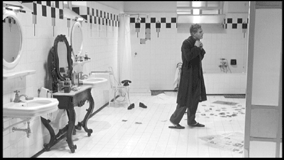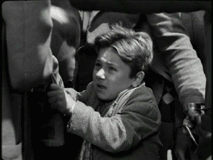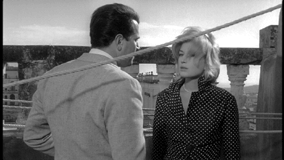My Voyage to Italy (Martin Scorsese) 2001
 My Voyage to Italy, Martin Scorsese’s four-hour
remembrance of his most influential brushes with Italian cinema is a definite
improvement over his earlier omnibus documentary A Personal Journey with
Martin Scorsese Through American Movies. For one thing, thanks to the
director’s hyper-selectivity this time around, Voyage features a better
set of movies than its American counterpart did. The films that he used to
illustrate his relationship with domestic cinema were a more idiosyncratic,
individualized batch than the paragons of postwar Italian cinema chosen here. By
focusing on the work of only five influential directors (Rossellini, De Sica,
Visconti, Fellini, and Antonioni) Scorsese is able to present an in-depth look
at several key works. I’m not certain of the exact number of films that are
presented here*, but each of them is given a detailed summary that lasts upwards
of ten minutes.
My Voyage to Italy, Martin Scorsese’s four-hour
remembrance of his most influential brushes with Italian cinema is a definite
improvement over his earlier omnibus documentary A Personal Journey with
Martin Scorsese Through American Movies. For one thing, thanks to the
director’s hyper-selectivity this time around, Voyage features a better
set of movies than its American counterpart did. The films that he used to
illustrate his relationship with domestic cinema were a more idiosyncratic,
individualized batch than the paragons of postwar Italian cinema chosen here. By
focusing on the work of only five influential directors (Rossellini, De Sica,
Visconti, Fellini, and Antonioni) Scorsese is able to present an in-depth look
at several key works. I’m not certain of the exact number of films that are
presented here*, but each of them is given a detailed summary that lasts upwards
of ten minutes.
 Some negatives arise from Scorsese’s approach here. If
one has already seen the majority of the films covered (few of them are
exceptionally obscure – many are considered essential classics of world
cinema), the scattershot insights about the films might not make the time spent
watching the segments about them worthwhile. If one hasn’t yet seen these
films, and intends to, they should be forewarned that the documentary freely
spoils the plots of the majority of the films covered. The simpler, neo-realist
films benefit more from this treatment than the later films, particularly those
by Antonioni and Fellini. Since Rossellini’s films relied more on plot than
style, a plot summary is able to convey more of the magic in his work than it
can with a Fellini film, since so much of Fellini’s work relies on the
accumulation of mood and images and the immersion in the director’s style. A
plot summary barely gets across the point of an abstract movie like 8 1/2.
Some personal tidbits about Scorsese’s Sicilian family’s relationship to
these movies emerge, particularly throughout the first hour, but later films
seem more haphazardly chosen. By far, the most interesting choices are those
that seem to be direct antecedents to Scorsese’s own films (the clearest
example being Visconti’s Senso, which contains an opera scene that is
startlingly similar to the opening moments of Scorsese’s The Age of
Innocence.).
Some negatives arise from Scorsese’s approach here. If
one has already seen the majority of the films covered (few of them are
exceptionally obscure – many are considered essential classics of world
cinema), the scattershot insights about the films might not make the time spent
watching the segments about them worthwhile. If one hasn’t yet seen these
films, and intends to, they should be forewarned that the documentary freely
spoils the plots of the majority of the films covered. The simpler, neo-realist
films benefit more from this treatment than the later films, particularly those
by Antonioni and Fellini. Since Rossellini’s films relied more on plot than
style, a plot summary is able to convey more of the magic in his work than it
can with a Fellini film, since so much of Fellini’s work relies on the
accumulation of mood and images and the immersion in the director’s style. A
plot summary barely gets across the point of an abstract movie like 8 1/2.
Some personal tidbits about Scorsese’s Sicilian family’s relationship to
these movies emerge, particularly throughout the first hour, but later films
seem more haphazardly chosen. By far, the most interesting choices are those
that seem to be direct antecedents to Scorsese’s own films (the clearest
example being Visconti’s Senso, which contains an opera scene that is
startlingly similar to the opening moments of Scorsese’s The Age of
Innocence.).
 Scorsese’s narration is endearing since he’s often
apologizing for the minor flaws in some of the films that he obviously loves.
Still, there’s some organizational messiness here. For example, the prologue
suggests the two tenets that the film will observe will be the neo-realist film
and the epic, but the movie never again brings up the Italian epic, and moves
directly into the realm of the auteur film after exploring neo-realism.
Considering the scope of the project, nearly any direction is acceptable,
however, so the creation of false expectation as to which direction it might
take is forgivable. As an introduction to Italy’s cinema, My Voyage to
Italy is quite an achievement, and comes highly recommended. Its passion is
contagious enough to allow you to ignore the film's omissions (Pasolini,
Bertolucci, Wertmuller, and several other key Italian directors, remain
unmentioned). To those already initiated, it might be more fruitful to spend time
with those films you’ve not yet seen.
Scorsese’s narration is endearing since he’s often
apologizing for the minor flaws in some of the films that he obviously loves.
Still, there’s some organizational messiness here. For example, the prologue
suggests the two tenets that the film will observe will be the neo-realist film
and the epic, but the movie never again brings up the Italian epic, and moves
directly into the realm of the auteur film after exploring neo-realism.
Considering the scope of the project, nearly any direction is acceptable,
however, so the creation of false expectation as to which direction it might
take is forgivable. As an introduction to Italy’s cinema, My Voyage to
Italy is quite an achievement, and comes highly recommended. Its passion is
contagious enough to allow you to ignore the film's omissions (Pasolini,
Bertolucci, Wertmuller, and several other key Italian directors, remain
unmentioned). To those already initiated, it might be more fruitful to spend time
with those films you’ve not yet seen.
* Off the top of my head, the film gives a detailed look at
the following: Cabiria, Open City, Paisan, Germany Year
Zero, Stromboli, The Miracle, The Flowers of St. Francis,
Europa ’51, Voyage to Italy, Obsessione, La Terra
Trema, Senso, Shoeshine, The Bicycle Thief, Umberto
D, The Gold of Naples, Marriage Italian-Style, I Vitelloni,
La Dolce Vita, 8 1/2, L’Avventura, and L’Eclisse.
* * * 1/2
05-26-02
Jeremy Heilman